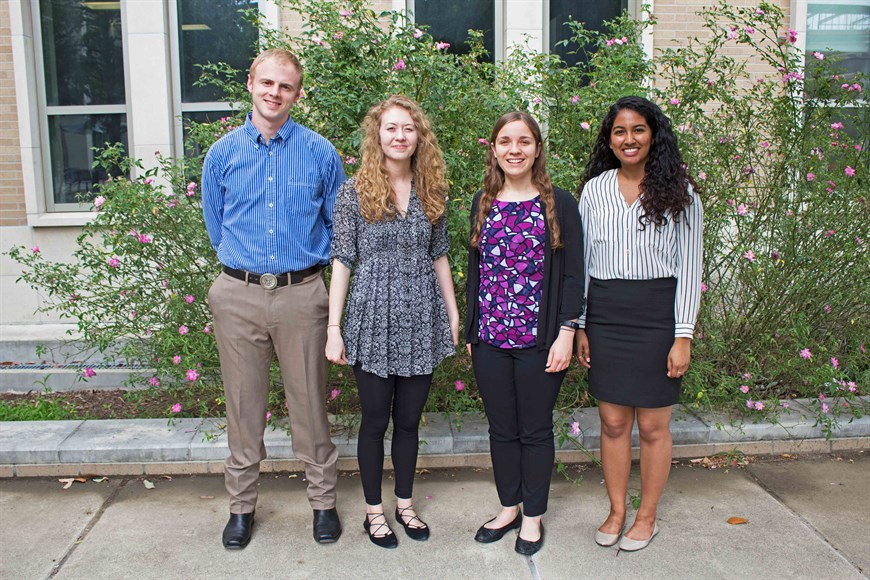 The National Science Foundation (NSF) has awarded fellowships through the Graduate Research Fellowship Program (GRFP) to four students in the Department of Biomedical Engineering at Texas A&M University.
The National Science Foundation (NSF) has awarded fellowships through the Graduate Research Fellowship Program (GRFP) to four students in the Department of Biomedical Engineering at Texas A&M University.
The 2017 awardees include (left to right) second-year doctoral student Paul Gordon and senior undergraduate students Hannah Pearce, Mikayla Barry and Jane Frederick.
The NSF GRFP is a highly competitive fellowship award, and out of 13,000 applicants only 2,000 students were selected this year. Awardees were selected from among a wide range of scientific disciplines and come from all states, U.S. commonwealths and territories.
Gordon, of Shreve, Ohio, began his graduate career at Texas A&M in the fall of 2016 after receiving a B.S. in biomedical engineering from the University of Cincinnati. Currently he is investigating optical techniques to detect malaria infections under the guidance of Dr. Gerard Cote. His hope is to identify biomarkers that will allow for the creation of a portable diagnostic device that can be used to augment current malaria detection techniques and improve patient outcomes in low resource settings.
“I owe a big thank you to those who wrote my letters of recommendation, and I couldn’t have put together a good application without the resources provided by the biomedical engineering department here at Texas A&M,” said Gordon.
Pearce, of Houston, Texas, began her career at Texas A&M in the fall of 2012 as a biochemistry and genetics double major. After a summer internship opportunity, Pearce changed her major to biomedical engineering. Currently she is working under the guidance of Dr. Daniel Alge to create a block copolymer system consisting of peptides and PEG-based chains formed through click reactions.
“The fellowship has already opened many doors in terms of flexibility for my graduate research,” said Pearce. “I am looking forward most to the opportunity to pursue my graduate degree and to better the lives of others.”
Barry, of Bryan, Texas, began her career at Texas A&M in the fall of 2013. Currently, she is performing research on polymer materials designed to help prevent clotting on medical implants under the guidance of Dr. Melissa Grunlan. Her hope is to develop a material that prevents clotting without the use of prescription medicines.
“It’s really an incredible honor to have received one of the 2,000 awards,” said Barry. “I worked hard during my application to convey the importance of the research I would like to do, as well as my qualifications in academics and research.”
Frederick, of Katy, Texas, also began her career at Texas A&M in the fall of 2013. Currently she is working under the guidance of Dr. Duncan Maitland creating shape memory polymer devices for treating cerebral and peripheral aneurysms.
“I am looking forward to what kinds of opportunities this fellowship will open up for me,” said Frederick. “I know it will help me a lot during graduate school and beyond, so I am excited to see what happens.”
The NSF GRFP helps to recognize and support the studies of U.S. residents, nationals and permanent residents attaining research-based master’s or doctoral degrees in the fields of science, technology, engineering and mathematics. Students apply for the fellowship program before or during their first year of graduate study and have the freedom to attend any university within the United States. Students who received awards will also receive financial support for the first three years of the five-year fellowship period.